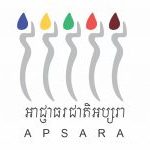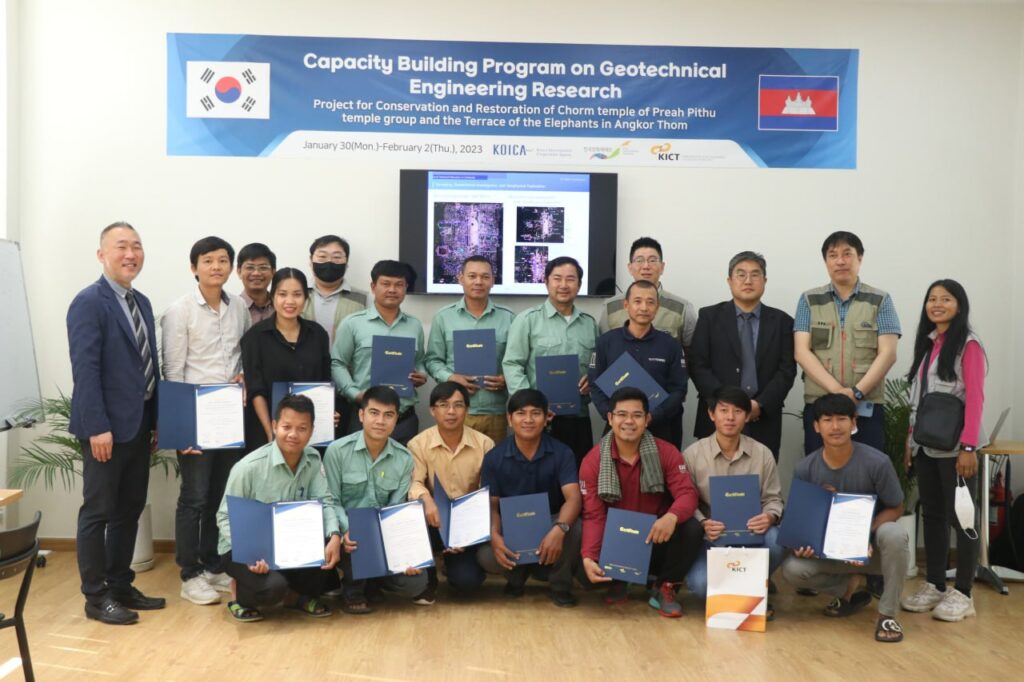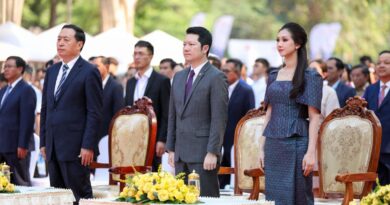មន្រ្តី និងបុគ្គលិកអាជ្ញាធរជាតិអប្សរា សរុបចំនួន១៥នាក់ បានទទួលការបណ្ដុះបណ្ដាល ទាក់ទងនឹងការគ្រប់គ្រងប្រព័ន្ធធារាសាស្រ្ដ, ការសិក្សាទៅលើស្រទាប់ដី និងការប្រើប្រាស់ ម៉ាស៊ីន GPR, DCPT, MASW នៅតាមបុរាណដ្ឋាន ពីអ្នកឯកទេសពីប្រទេសកូរ៉េ។
លោក Jeoung Jae Hyeung មន្រ្តីនៃនាយកដ្ឋានស្រាវជ្រាវវិស្វកម្មភូមិសាស្ត្រនៃ វិទ្យាស្ថានវិស្វកម្មស៊ីវិល និងបច្ចេកវិទ្យាសំណង់កូរ៉េ (KICT) បានឱ្យដឹងថា គម្រោង បណ្ដុះបណ្ដាល ប្រព័ន្ធគ្រប់គ្រងទឹកនៅព្រះលានជល់ដំរី មានរយៈពេល៤ថ្ងៃ គឺពីថ្ងៃទី៣០ ខែមករា រហូតដល់ថ្ងៃទី២ ខែកុម្ភៈ។ វគ្គបណ្ដុះបណ្ដាលនេះ ផ្ដោតសំខាន់លើការសិក្សា លក្ខណៈដី ការរៀបចំដី ការអង្កេតដី លក្ខណៈភូមិសាស្រ្ដ ការវិភាគលើទឹកក្រោមដី និងលើដី និង ការប្រើប្រាស់ឧបករណ៍ដើម្បីវិភាគ។ល។
ក្រៅពីសិក្សាទ្រឹស្តី សិក្ខាកាមទាំងអស់ ក៏បានចុះទៅសិក្សា និងអនុវត្តន៍ដោយផ្ទាល់នៅការដ្ឋាន ព្រះលានជល់ដំរី និងក្រុមប្រាសាទព្រះពិធូផងដែរ។ គម្រោងខាងលើបានជ្រើសរើសទីតាំងនេះ ដោយព្រះលានជល់ដំរី និង ក្រុមប្រាសាទព្រះពិធូ ជាគម្រោងដែលកំពុងធ្វើការជុសជុលដោយ បានការគាំទ្រនិង កិច្ចសហប្រតិបត្តិការពីស្ថាប័ន ភ្នាក់ងារសហប្រតិបត្តិការអន្តរជាតិកូរ៉េ (KOICA) តាមរយៈមូលនិធិបេតិកភណ្ឌវប្បធម៌កូរ៉េ(KCHF)។
លោក Jang Cheol-Hee មន្រ្តីជាន់ខ្ពស់នៃនាយកដ្ឋានស្រាវជ្រាវវិទ្យាសាស្ត្រវារី និងវិស្វកម្ម នៃស្ថាប័ន KICT មានប្រសាសន៍ថា ប្រព័ន្ធធារាសាស្រ្ដ មានសារសំខាន់សម្រាប់ប្រទេសនីមួយៗ ហើយវាកាន់តែសំខាន់ សម្រាប់ប្រទេសដែលមានអគារខ្ពស់ៗ ដូចជាកូរ៉េជាដើម។ លោកបន្តថា វាជាចំណុចល្អមួយដែលកម្ពុជា អាចរៀនពីការងារគ្រប់គ្រងទឹកពីប្រទេសកូរ៉េ ដើម្បីទទួលបានចំណេះដឹងសម្រាប់ការអភិវឌ្ឍនាពេលអនាគត។
ចំពោះស្ថានភាពប្រព័ន្ធគ្រប់គ្រងទឹកនៅព្រះលានជល់ដំរី លោក Jang Cheol-Hee ពន្យល់ថា ដីមានស្ថានភាពមិនសូវជ្រាបទឹកល្អ ដែលត្រូវការសិក្សាបន្ថែមទៀត ដើម្បីរកដំណោះស្រាយ ដើម្បីបញ្ជៀសទឹកពេលមានទឹកជន់ច្រើន។
សិក្ខាកាមមួយរូបដែលចូលរួមក្នុងវគ្គបណ្ដុះបណ្ដាល គឺលោក ឡៃ ប៉ូទី អនុប្រធាននាយកដ្ឋានគ្រប់គ្រងទឹក ព្រៃឈើ និងហេដ្ឋារចនាសម្ព័ន្ធ នៃអាជ្ញាធរជាតិអប្សរា វាយតម្លៃខ្ពស់ចំពោះការសិក្សានេះ។ លោកយល់ថា ជាការល្អប្រសើរសម្រាប់បុគ្គលិក មន្រ្តី អាជ្ញាធរជាតិអប្សរា ដែលទទួលការបណ្ដុះបណ្ដាលបន្ថែមដែលអាចពង្រឹងចំណេះដឹង និងវិធីសាស្រ្ដក្នុងការចូលរួមអភិរក្សក្នុងតំបន់អង្គរ។
រយៈពេល៤ថ្ងៃនេះ លោកបានរៀនពីការប្រើប្រាស់ឧបករណ៍បង្ហាប់ដី ការកិនបង្ហាប់ដី ក្នុងកម្រិតណា ឱ្យសមស្របតាមប្រភេទដី។ ការសិក្សាពីប្រភេទដីក្នុងតំបន់រមណីយដ្ឋានអង្គរ ការប្រើប្រាស់ឧបករណ៍ស្កែន ដើម្បីមើលពីស្ថានភាពដី ប្រភេទដីខ្សាច់ ប្រព័ន្ធទឹក និងថ្មបុរាណដែលសេសសល់នៅក្រោមដីជាដើម៕
អត្ថបទ៖ នាង សំណាង
រូបភាព៖ ភោគ ជា, KICT
A total of 15 officials and staff of APSARA National Authority received training related to Hydrological management, soil study, and use of GPR, DCPT, and MASW in archeological sites by experts from Korea.
Jeoung Jae Hyeung, an official of the Department of Geotechnical Engineering Research at the Korea Institute of Civil Engineering and Building Technology (KICT), said the four-day water management system training project at the Elephant Terrace conducted from 30 January to 02 February. This course focused on the study of soil characteristics, soil preparation, soil survey, geography, surface water-groundwater analysis, and the use of analytical tools, etc.
In addition to studying the theory, all participants also went to study and practice directly at the site of the Terrace of the Elephants and the Preah Pithu Temple. The project was chosen by the Terrace of the Elephants and the Preah Pitou Temple Group as a project under repair with the support and cooperation of the Korea International Cooperation Agency (KOICA) through the Korea Cultural Heritage Foundation (KCHF).
Jang Cheol-Hee, a senior official at KICT’s Department of Hydro Science and Engineering Research, said that irrigation is important for each country, and even more so for high-rise countries like Korea. He added that it was a good point for Cambodia to learn about water management from Korea to gain knowledge for future development.
Regarding the condition of the water management system at Elephant Terrace, Jang Cheol-Hee explained that the soil is not very well-drained, which needs to be studied further to find a solution to avoid flooding.
One of the participants in the training was Mr. Lay Poti, Deputy Director of the Department of Water, Forestry and Infrastructure Management of the APSARA National Authority, who highly appreciated the study. He thought that the staff of APSARA National Authority should receive additional training that can strengthen the knowledge and methods to participate in conservation in the Angkor area.
During these four days, he learned how to use soil compactors, and how to grind and compact soil according to the type of soil as well as to study soil types in the Angkor area, and use scanners to see the condition of the soil, sand, water system, and ancient stones left underground.
Article: Neang Samnang
Photos: Phouk Chea, KICT





